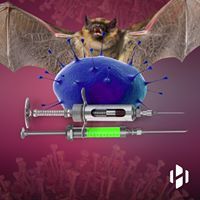Page 7871
Feb 21, 2020
Your brain waves could predict if an antidepressant will work for you
Posted by Genevieve Klien in categories: biotech/medical, neuroscience
Feb 21, 2020
I Was Diagnosed with Stage III Lung Cancer. Here’s What I Want Everyone to Know
Posted by Genevieve Klien in category: biotech/medical
I get emotional talking about my lung cancer. When I was first diagnosed and learned how serious it was, I thought it was a death sentence. And it all started with something so small: a cyst under my armpit.
My husband and I usually go to all of our routine doctor’s visits together. At one of my husband’s appointments, I happened to mention the cyst, since it had been bothering me. I was hoping the doctor could help, but he said it was too big to take care of in the office, and made me an appointment with a surgeon.
At the time, the cyst removal didn’t seem like a big deal, and I didn’t think much of it. I was 72 years old, and I didn’t feel sick in any way. As part of the routine procedure prep, my surgeon ordered a chest X-ray. We were all surprised when the imaging showed that I had a cancerous tumor in my right lung that needed to be surgically removed. Initially, my surgeon told me it was Stage I, small, and not serious, so I wasn’t too concerned.
Feb 21, 2020
This Company Built a Gigantic Centrifuge to Fling Rockets Into Space
Posted by Genevieve Klien in categories: biotech/medical, genetics, space travel
In some biology classes, teachers will place vials of spit into a funny looking contraption and let it spin around the samples until the stringy DNA separates from the rest of the saliva. It’s a pretty rudimentary experiment, but it quickly gets to the heart of not only your own genetic material, but also how centrifugal force works: Spinning really fast in a circle creates a force strong enough to push a moving object out and away from the center of its path.
But what happens when that moving object is a rocket that weighs thousands of pounds? We might find out as soon as this year, when a cryptic startup called SpinLaunch starts suborbital test flights of a rocket that is launched using an enormous centrifuge.
Here’s the gist: A centrifuge the size of a football field will spin a rocket around in circles for about an hour until its speed eventually exceeds 5,000 miles per hour. At that point, the rocket and its payload will feel forces 10,000 times stronger than gravity. When the centrifuge finally releases the rocket at launch speed, it should, practically speaking, fly through the stratosphere until it fires its engines at the periphery of our atmosphere.
Feb 21, 2020
Radical hydrogen-boron reactor leapfrogs current nuclear fusion tech
Posted by Genevieve Klien in categories: nuclear energy, particle physics
“We are sidestepping all of the scientific challenges that have held fusion energy back for more than half a century,” says the director of an Australian company that claims its hydrogen-boron fusion technology is already working a billion times better than expected.
HB11 Energy is a spin-out company that originated at the University of New South Wales, and it announced today a swag of patents through Japan, China and the USA protecting its unique approach to fusion energy generation.
Fusion, of course, is the long-awaited clean, safe theoretical solution to humanity’s energy needs. It’s how the Sun itself makes the vast amounts of energy that have powered life on our planet up until now. Where nuclear fission – the splitting of atoms to release energy – has proven incredibly powerful but insanely destructive when things go wrong, fusion promises reliable, safe, low cost, green energy generation with no chance of radioactive meltdown.
Feb 21, 2020
Want to Look Inside a Brain? With Transparent Organs, You Can
Posted by Genevieve Klien in categories: biotech/medical, neuroscience
Using clever chemical wizardry, researchers have made human organs see-through. The dazzling 3D maps could one day lead to organs made in the lab.
Feb 21, 2020
Jupiter-like exoplanet orbits its star in only 18 hours
Posted by Genevieve Klien in category: space
Astronomers have observed an exoplanet orbiting a star in just over 18 hours – the shortest orbital period ever seen for a planet of its type.
This means that a single year for this hot Jupiter-like planet – a gas giant similar in size and composition to Jupiter in our own Solar System – passes in less than a day of Earth time.
Scientists believe the discovery may help solve the mystery of whether such planets are in the process of spiralling towards their suns to their destruction.
Feb 21, 2020
Rocket Report: Astra nearing first launch, Starship may soon roll to pad
Posted by Genevieve Klien in category: space travel
Feb 21, 2020
Google AI will no more tag gender in photos
Posted by Genevieve Klien in categories: business, health, robotics/AI
A Google AI tool that can recognise and label what’s in an image will no longer attach gender tags like “woman” or “man” to photos of people. Google’s Cloud Vision API is a service for developers that allows them to, among other things, attach labels to photos identifying the contents. The tool can detect faces, landmarks, brand logos, and even explicit content, and has a host of uses from retailers using visual search to researchers identifying animal species.
Feb 21, 2020
Artificial intelligence yields new antibiotic
Posted by Genevieve Klien in categories: biotech/medical, robotics/AI
A deep-learning model identifies a powerful new drug that can kill many species of antibiotic-resistant bacteria.


















